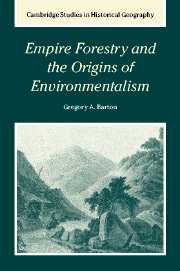Book contents
- Frontmatter
- Contents
- List of illustrations
- Acknowledgments
- 1 Introduction
- 2 The great interference
- 3 Empire forestry and British India
- 4 Environmental innovation in British India
- 5 Empire forestry and the colonies
- 6 Empire forestry and American environmentalism
- 7 From empire forestry to Commonwealth forestry
- Bibliography
- Index
- Cambridge Studies in Historical Geography
7 - From empire forestry to Commonwealth forestry
Published online by Cambridge University Press: 13 July 2009
- Frontmatter
- Contents
- List of illustrations
- Acknowledgments
- 1 Introduction
- 2 The great interference
- 3 Empire forestry and British India
- 4 Environmental innovation in British India
- 5 Empire forestry and the colonies
- 6 Empire forestry and American environmentalism
- 7 From empire forestry to Commonwealth forestry
- Bibliography
- Index
- Cambridge Studies in Historical Geography
Summary
As the empire transformed into a commonwealth, so empire forestry transformed into Commonwealth forestry. Forestry and the institutions that had been built to protect the environment were handed intact to the westernized elites who controlled most of the newly independent states following the Second World War. The conservation movement broadened in the postwar years to include sweeping protections for wildlife, flora, wetlands, and issues of pollution and population control. The conservation movement, with empire forestry at its core, merged with other streams of thought and activities to form the core of a modern environmental movement that includes forestry as a central concern.
Empire forestry, transformed into Commonwealth forestry, is now lost in the broader environmental movement that it helped form precisely because of its success. Its conceptions of government ownership of nature, the right to settle land claims and reservation, the multiple-use doctrine based on Benthamite ideals of the greatest good to the greatest number, these conceptions are now so integral to environmental thinking that empire forestry has, by its success, been largely forgotten. As the empire changed into a commonwealth the massive inheritance from empire forestry has been harnessed in some cases, and improved upon and squandered in others. Once again the question of the rule of law has surfaced. Where countries that attained independence kept the law over the government official, and administered it responsibly, the environment has to that same extent been protected.
- Type
- Chapter
- Information
- Empire Forestry and the Origins of Environmentalism , pp. 144 - 166Publisher: Cambridge University PressPrint publication year: 2002

